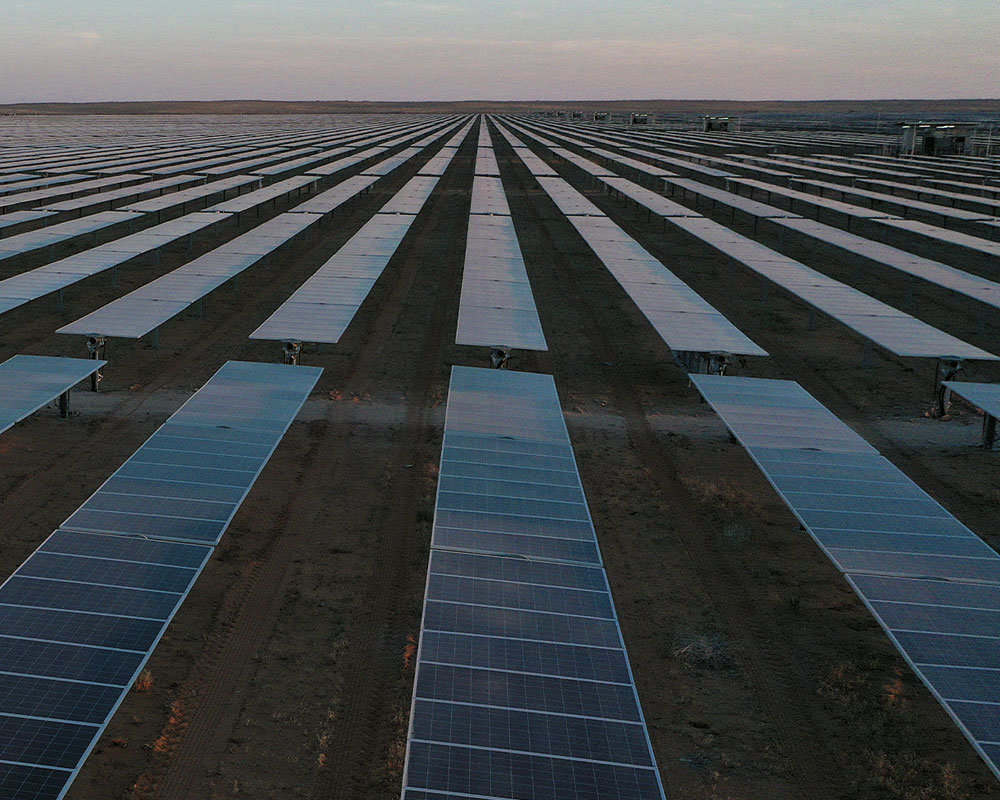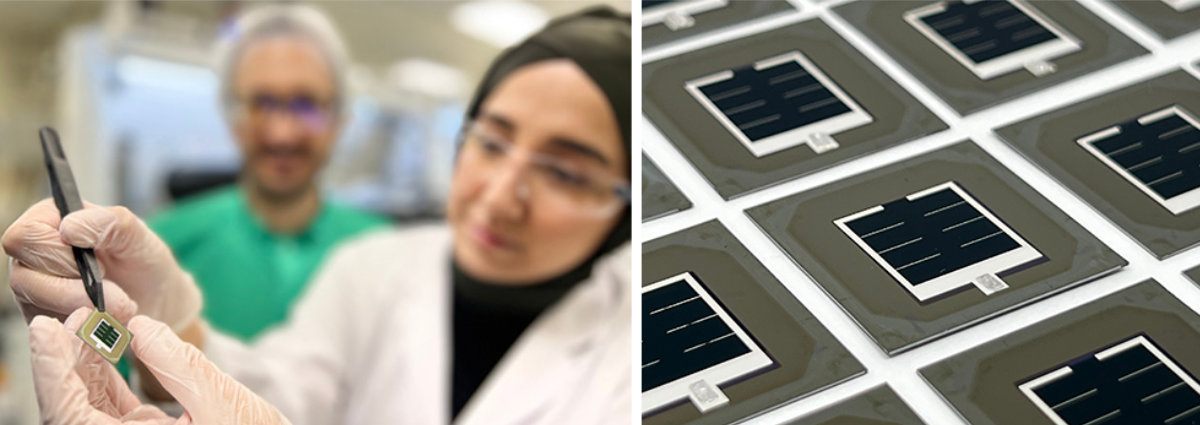RIYADH: Saudi Arabia is embarking on a transformative journey to establish itself as a key player in the global renewable energy sector.
With a goal of sourcing 50 percent of its electricity from renewable sources by 2030, the Kingdom is investing heavily in solar energy, capitalizing on its abundant sunlight.
This commitment is part of the broader National Renewable Energy Program strategy, aimed at diversifying its energy portfolio and reducing reliance on fossil fuels.
By the end of the decade, Saudi Arabia aims to generate 58.7 gigawatts of renewable energy. This includes 40 GW from solar photovoltaics, alongside 16 GW from wind energy and 2.7 GW from concentrated solar power.

The scale of this initiative underscores the Kingdom’s commitment to a sustainable energy future.
In 2024, Abdulaziz bin Salman, the Saudi minister for energy, announced plans to tender new renewable energy projects with an annual capacity of 20 GW. This could potentially lead to a total capacity of 100-130 GW by 2030.
The pace of these developments will depend on the growth in electricity demand, indicating a proactive approach to meeting future energy needs.
A significant milestone was reached on June 26, 2023, when the Saudi Power Procurement Company signed power purchase agreements for three new solar PV projects totaling 5.5 GW.
These are Haden Solar PV in Makkah Province with 2,000 megawatts, Al-Muwayh Solar PV in Makkah Province with a further 2,000 MW, and Al-Khushaybi PV in Qassim Province with 1,500 MW.
Several solar power plants are already operational. These include the Sakaka Solar PV Park, the first project under the NREP, generating 300 MW in Al-Jawf.
Another is Rabigh Solar PV Park at Rabigh Industrial City in Makkah region, which generates 400 MW, and Jubail 3B IWP Solar PV Park which produces 45.5 MW, powering the Jubail 3A water desalination plant in Eastern Province.

Rabigh Solar PV Park at Rabigh Industrial City generates 400 MW. (Supplied)
The Haradh Solar PV Park generates 30 MW in Eastern Province, and Al-Kharj Solar PV Park produces 15 MW in Riyadh.
Looking ahead, several major solar projects are in the planning stages, such as Al-Sadawi Independent Power Producer Solar Power Plant, set to have a capacity of 2,000 MW.
Sudair Solar PV Project has a planned capacity of 1,500 MW in Riyadh. Al-Masa’a IPP Solar Power Plant will generate 1,000 MW in Hail, while Ar Rass Solar PV Park is expected to have a capacity of 700 MW in Al-Qassim.
These upcoming projects demonstrate Saudi Arabia’s positive approach to expanding its renewable energy capabilities and its readiness to meet growing energy demands.
Despite these advancements, experts have cautioned against overestimating the impact of current growth.
“Saudi Arabia has a yearly energy demand of about 400 terawatt hours,” Michael Salvador, co-founder and CEO of Mirai Solar and technology lead at the King Abdullah University of Science and Technology’s Solar Center, told Arab News.
“To meet this need solely through renewables, approximately 200 GW of installations would be required.”
The recent addition of 2 GWs represents roughly 1 percent of that demand, all while energy consumption is rapidly increasing, he said.
DID YOUKNOW?
• Saudi Arabia aims to source 50 percent of its electricity from renewable energy sources by 2030.
• The Kingdom plans to generate 58.7 GW of renewable energy by 2030, with 40 GW from solar PV.
• Between 2022 and 2024, it added 2.1 GW of renewable capacity, enough to power more than 520,000 homes.
Saudi Arabia’s Ministry of Investment has highlighted the need for further investment to optimize these large-scale solar projects that are part of NREP to leverage the Kingdom’s abundant natural resources for renewable energy production.
To do this, the government is also capitalizing on its access to large regional markets, its growing knowledge-driven economy, and an ecosystem designed to attract investors.
Between 2022 and early 2024, Saudi Arabia added 2.1 GW of renewable power capacity — a 300 percent increase from the 700 MW that was created between 2012 and 2022.
Since 2022, some 2,100 MW of renewable energy has been added to the grid, totaling 2,800 MW. This is enough to power more than 520,000 homes.
“While the 300 percent increase sounds impressive, it’s crucial to recognize that it’s just a start,” said Salvador. “If we think of it in terms of absolute energy needs, the challenge remains substantial.”
In December 2023, Saudi officials announced how the Kingdom intended to achieve net zero by 2060. They highlighted more than 80 initiatives, funded by a $188 billion investment, for a greener future.
Founded in 2019 as a spinoff from KAUST, Mirai Solar is pioneering innovative solar panel technology aimed at enhancing PV efficiency. The firm has championed the concept of “PV shading,” which utilizes blocked sunlight to generate electricity.
This technology has promising applications across various sectors, including sustainable agriculture and electric vehicle charging stations.
“To accelerate the energy transition, we need both utility-scale deployment and decentralized renewable energy solutions,” said Salvador.
While the government has primarily focused on large-scale projects, Salvador said he supports smaller, decentralized systems that can be quickly implemented and have a meaningful impact, provided the right legislative and financial incentives are in place.
The environmental benefits of Saudi Arabia’s push for solar energy are significant. Salvador calculates that generating 4 TWh of energy from solar could potentially avoid 2.8 million tons of CO2 emissions annually, equivalent to the greenhouse gas emissions from approximately 6.5 million barrels of oil.
This reduction aligns with global efforts to combat climate change and highlights the Kingdom’s commitment to a greener future.
Salvador believes a greater focus is needed on educating the public about why renewables are important from an economic and environmental perspective if solar technology development is to succeed in Saudi Arabia.
“Create incentives for everyone to consider and adopt renewable energy solutions,” he said. “Now, this can’t be implemented overnight. Things like grid stability need to be considered first.”
However, he said promoting innovation specific to the country will help accelerate the transformation. “Shading is, for me, a prominent example because it’s everywhere. Shading could power schools, hospitals, universities, office buildings, and food production.”
Salvador said it was also crucial to highlight research in future technologies.

Combo image showing KAUST postdoctoral fellow Esma Ugur displays the perovskite/silicon tandem solar cell that she and team researchers in the KAUST Photovoltaics Laboratory developed (left) and a close view of the Close view of the tandem solar cell, recognized as the world’s most efficient silicon/perovskite tandem solar cell (right). (Photos courtesy of KAUST)
“KAUST is a good example, where the research group of Stefaan de Wolf has established multiple world records of a new and promising technology called silicon-perovskite tandem solar cells, which could revolutionize the manufacturing of solar panels,” he said.
As Saudi Arabia positions itself at the forefront of the renewable energy transition, the combination of government support, technological innovation, and strategic investment will be crucial in realizing its ambitious goals in solar energy.
The Kingdom’s solar power surge is not only vital for local energy security but also plays a significant role in combating climate change and promoting sustainable development in the region.

































